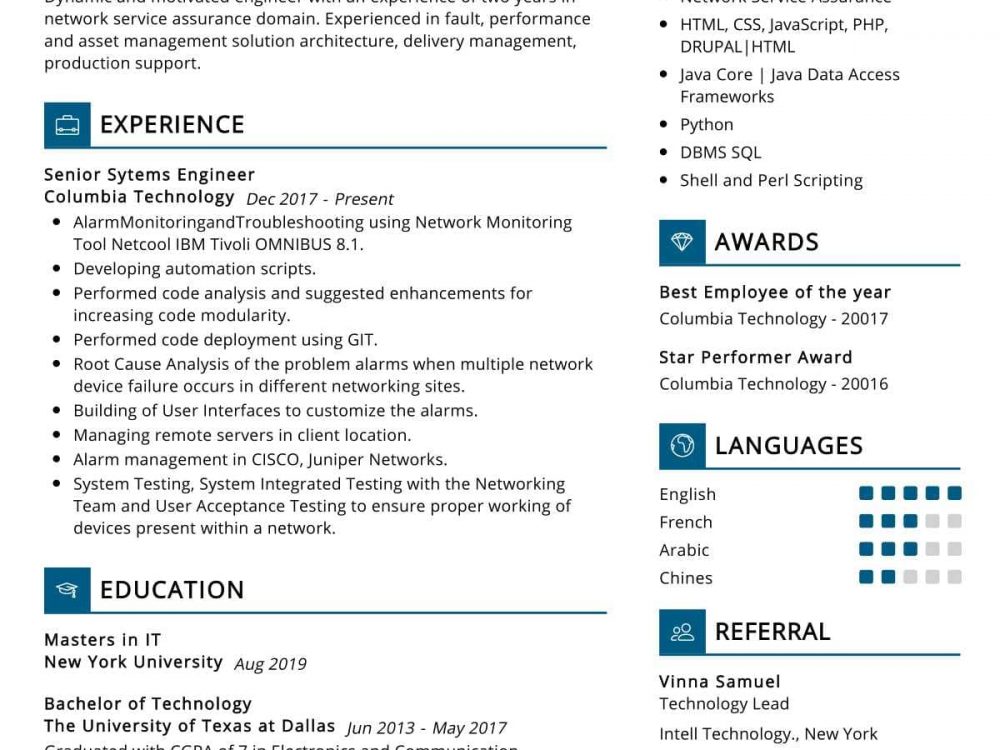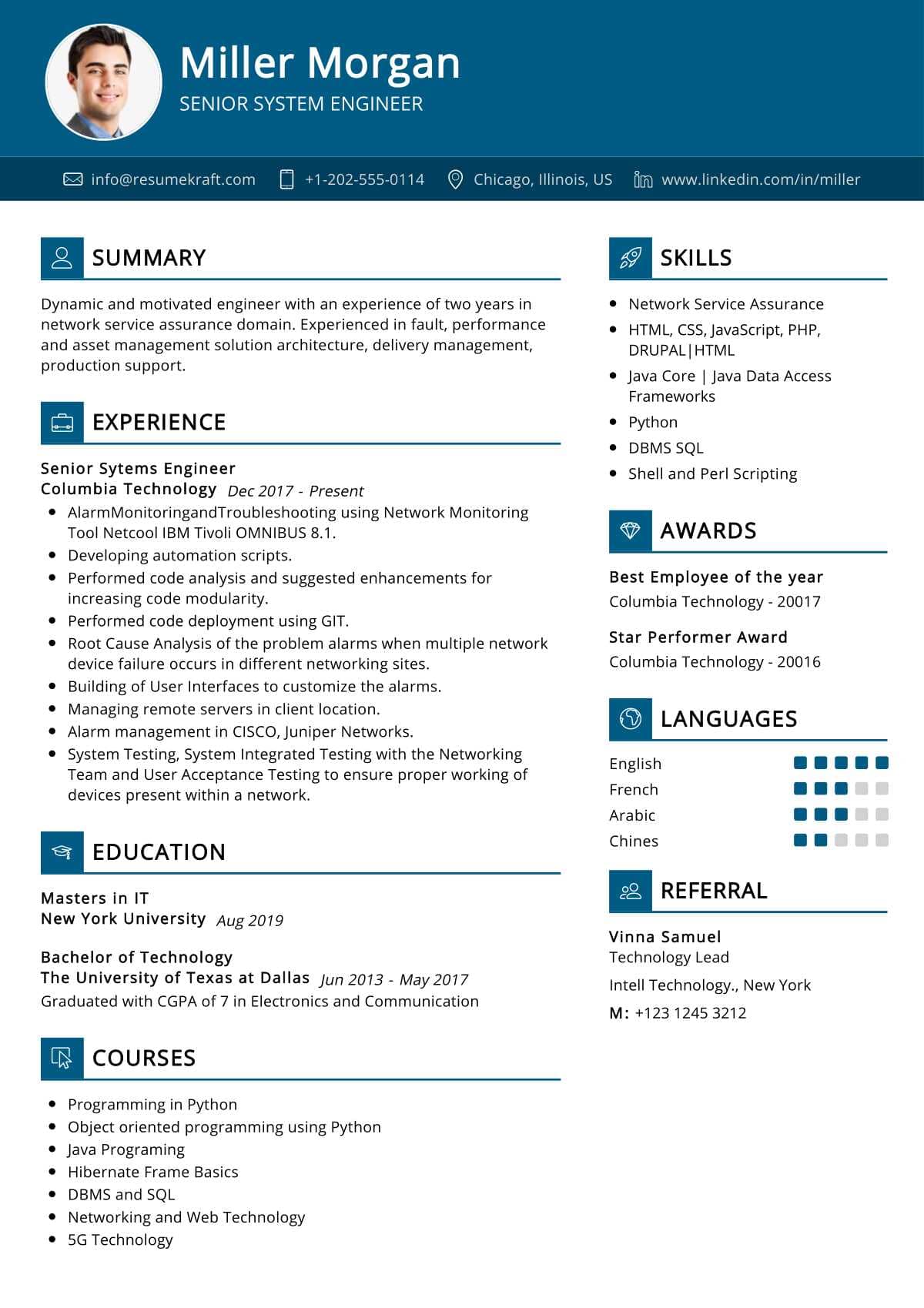Are you a Senior System Engineer by profession and looking for an exciting career? We have good news for you! use our professional Senior System Engineer Resume Sample. You don’t have to start writing from scratch. Just click “Edit Resume” and modify it with your details. Update the template fonts and colors have the best chance of landing your dream job. Find more resume samples.
Senior System Engineer Resume Sample
Miller
Senior System Engineer
Summary
Dynamic and motivated engineer with experience of two years in the network service assurance domain. Experienced in fault, performance, and asset management solution architecture, delivery management, production support.
Skills
Work Experience
Senior Sytems Engineer
Columbia Technology
- AlarmMonitoringandTroubleshooting using Network Monitoring Tool Netcool IBM Tivoli OMNIBUS 8.1.
- Developing automation scripts.
- Performed code analysis and suggested enhancements for increasing code modularity.
- Performed code deployment using GIT.
- Root Cause Analysis of the problem alarms when multiple network device failure occurs in different networking sites.
- Building of User Interfaces to customize the alarms.
- Managing remote servers in client location.
- Alarm management in CISCO, Juniper Networks.
- System Testing, System Integrated Testing with the Networking Team and User Acceptance Testing to ensure proper working of devices present within a network.
Education
Masters in IT
New York University
Bachelor of Technology
The University of Texas at Dallas
Languages
- French
- English
- German
- Chines
Career Expert Tips:
- Always make sure you choose the perfect resume format to suit your professional experience.
- Ensure that you know how to write a resume in a way that highlights your competencies.
- Check the expert curated popular good CV and resume examples
System Engineer Resume with Writing Guide
It’s a case of hunt or be hunted; if you want to make yourself stand out in this competitive market, you need a resume that will grab the eyes of hiring managers. Here is an overview on how to write your System Engineer Resume and cover letter, plus tips from industry professionals and essential links for further help.
What To Include
- Make sure your resume is clear and concise.
“When preparing your resume, make sure the information you are listing is relevant to the position you are applying for. If it’s not, remove it,” says Bill Williams, senior manager at the U.S.-based staffing firm Robert Half Technology. “The amount of detail that is listed on a resume should be proportional to the experience level of the candidate. In addition, make sure that your information is relevant and compelling.”
- Be clear and specific about your skills, experience and achievements.
“The job seeker should include the keywords in their resume, but it’s not a requirement,” says Leila Mottl, executive director of the staffing firm Strategic Edge Recruiting. “Keep in mind that not all keywords are technical; soft skills or other areas of expertise can also be identified by keywords.”
- Give the hiring manager a clear idea of how you meet the criteria for the position.
“This means defining your skills and capabilities over time, not listing every single piece of great experience that you have,” says Mottl. “Use examples to illustrate your abilities and your achievements.”
- Don’t focus all of your attention on your past achievements, such as assignments, projects or companies to which you contributed.
“It is important to find a balance between your accomplishments and your experience,” says Mottl. “You do not want to look too promotional, but you also want to make sure that the hiring manager understands how your expertise will benefit his or her organization.”
- Make sure the details about your education and skills are consistent with what’s in your resume.
“As a technical professional, it is very important for the job seeker to review their resume(s) carefully and ensure that all of the details are correct,” says Mottl. “In addition, make sure that you have spelled all of your experience correctly or it may be assumed that you simply copied and pasted a piece of information from another source.”
- Don’t include references on your resume.
“You don’t need your references on your resume if you are applying for a job being considered as the sole source of the experience mentioned on your resume,” says Williams. “If you need references, you should get them researched and then turn them over to the hiring manager.”
List of Typical Responsibilities For a System Engineer Resume:
- System design and implementation
- Troubleshooting, support, and maintenance of hardware, software, networks, or both
- Managing IT projects from inception to completion
- Project management and leadership
- Leading teams of system analysts or engineers
- Preparing systems for deployment
- Documenting how to assemble components
- Providing technical documentation
- Training users on new applications
- Developing training curriculum
- Developing standard documentation for installation and maintenance
- Assisting customers with software requirements
- Assisting customers with hardware requirements
- Finding and selecting solutions to meet customer needs
- Researching new technologies and new software
- Searching for vendors using online resources
List of Typical Skillsets For a System Engineer Resume:
- Ability to research, plan, develop, document and deliver IT solutions
- Ability to identify key technical requirements
- Ability to bring together IT resources including hardware and software
- Skill in working with hardware and software engineers
- Ability to create network diagrams
- Familiarity with operating systems
- Skill in system design
- Ability to communicate effectively
- Familiarity with networking boards and hardware
- Familiarity with BIOS, configuration of operating systems, troubleshooting of common problems
- Skill with Windows operating system
- Knowledge of relational database system design and implementation
- Knowledge of object oriented programming languages such as C++
- Knowledge of scripting languages such as Perl
A list of typical titles for a System Engineer resumes: Project Manager, IT Project Manager, Software Project Manager, Telecommunications Manager, Technical Supervisor, Computer Specialist Supervisor or Systems Technology Supervisor.
Tips to write a System Engineer Resume Summary:
- Be concise – do not ramble. Pick 2-3 things you REALLY want your prospective employer to know about your background and experience, and make sure they are succinctly summarized.
- Avoid clichés – the employer is looking for things that are original, unique and impactful, so avoid generic phrases like “expert” or “skilled” in your resume’s summary section.
- Lastly, make sure to highlight skills that the employer will find useful (e.g. teamwork, communication skills, strong verbal skills).
- For your skill section, do NOT include things you learned at your previous job. Your employer is more interested in YOU than any skills that happened at your previous job.
- If necessary, update your resume with more information after you’ve sent it out to recruiters and interviewers. This includes things like new certifications or upgrades to your background (e.g. education or experience) and additional contact information (which is important if you are interested in getting a callback).
How to write a System Engineer Resume with No experience:
- Determine what type of System Engineer resume you need.
- Create an online account on a computer and internet that is always connected to your phone and email. This is so that you are able to view the pages on the computer as well as view any edits made from your phone or email. For example: Gmail, Yahoo mail, Hotmail etc… All free accounts.
- They are many different formats for resumes; chronological, functional and combination of both types. [Resume section to be written by articles author — cite the source for the information]
- Highlight your employment gaps with volunteering or extra-curricular activities.
- Retype your name and contact information at the top of every page, unless directed otherwise. Make sure all spelling is correct, when possible use a spell-checker to find any errors before submitting your PDF resume file. Be consistent with formatting and font type, size 16 is recommended so that you are able to have lines for each position listed.
How to write a System Engineer Cover Letter:
- Begin with “To Whom It May Concern” and the date.
- Next, write a salutation such as Dear Mr. Smith or Dear Sirs.
- Follow it up with a “subject line.” This makes it easier for hiring managers to find your letter in their mailbox, sometimes they may have hundreds of letters to sort through if they get many applicants for a single position. A good subject line is like the title of your System Engineer Resume: System Engineer Cover Letter from John Doe concerning Project Title_
- You’re done! The rest of the letter includes your information, skills, and experience. You don’t need to include the names of all your former employers; if you have more than one position, but each employer’s name on a separate line.
- You may want to include a resume summary at the end of your cover letter. A good summary is about two or three paragraphs long with a brief description of why you want this job.
Key Takeaways:
- Your resume should highlight your experience, skills and knowledge across the broadest possible range of topics.
- A simple framework for a written resume will help you organize your information.
- Resumes should be tailored to each specific job posting, so be sure to focus on keywords that are most relevant to the position you are applying for.
- Resumes are almost always reviewed online. It is best to keep your resume to one page.
- The most important information should be at the top of the resume and at the top of each section.
- Recruiters typically scan resumes at a rate of 70-100 words per minute. Use this information to your advantage in structuring your content.


